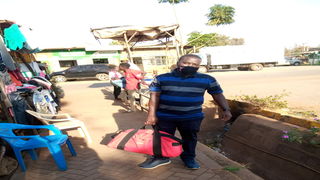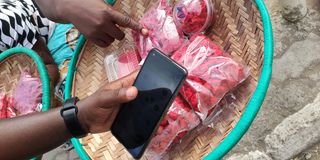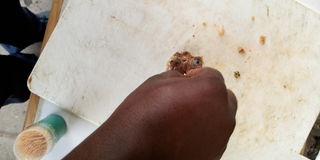
In Emali.
|Mombasa to Malaba on M-Pesa
What you need to know:
- Our special correspondent spent four days on the road.
- He found out how deep M-Pesa has permeated the Kenyan commercial enterprise and to what effect on mobility, ease of trade and social good.
From Mombasa to Malaba by road, 928 kilometres in total, using public transport. Three days, two overnight stopovers. The question was: Could I manage that journey with the money at my disposal solely on M-Pesa?
At least 24 times along the way, I recorded people’s reactions after asking if I could use M-Pesa to pay for the goods or services they were offering. From the nonchalant madafu seller in Mombasa to the frantic shoeshine in Emali and the taciturn boiled groundnuts hawker in Kanduyi, it was an interesting mix of responses.
Predictably, I got more ‘ayes’ than ‘nays’. And the ‘Nos’ were often accompanied by an explanation of either not having a phone or having taken a Fuliza loan.
Mombasa to Malaba is a roller-coaster journey. At times you cruise through flat and mundane swathes of land and you feel sleep stalking your eyelids, the monotonous groan of the diesel engine singing a powerful lullaby to you.
At other times, you will be going up valleys and mountains, with the drastic changes in altitude threatening to ruin your eardrums while the daring overtaking manoeuvres leave you on the edge of your seat, a final prayer at the tip of your tongue.
There are areas so dry they look like they are on their knees, begging humans not to think of dropping even a cigarette butt because the tinderbox of dried grass and withering vegetation will burst into flames — and recently burnt vegetation features prominently in the eastern sides of the country.
On the western sides, however, tenacious torrents of rain pummel your van’s windscreen as the driver ignores the spirited screams of the speed governor while accelerating on a lane left by trucks on a queue as their drivers await clearance to enter Uganda. The heavy rain makes the van’s wipers look inept and the land appears so drenched that it is about to say a “no, thank you” to the skies.
On the journey, you see a change of goods on sale by the road. The animals being sold to motorists change from chicken to ducks and turkeys while the farm produce ranges from tomatoes to onions to cabbages and sometimes green maize.
So, how easy is it to traverse Kenya relying on M-Pesa? Quite a ride. I bought Sh30 mutura on a ‘Buy Goods’ till number. And I ordered a pizza online late into the night and no one doubted my commitment to pay for it via M-Pesa once it was delivered. The pizza came in less than half an hour, I sent the money and the rest was calories.
At many points along the journey, I had to remind myself that it was not always this certain with M-Pesa. In the months following March 2007 when the mobile-based payment service was unveiled, it was not always guaranteed that you could buy something from a total stranger by the use of a mere SMS and invisible money.
In instances when someone told me to withdraw hapa kando tu before paying for something, I flashed back to the days when one could move from an M-Pesa agent to another while in need of cash withdrawal and all one got was the irritating “sina float” response. No single agent among those I engaged across the journey of October 12-14 turned me down.
By design, I spent little time in Nairobi. But this is where I have used M-Pesa quite frequently; where some innovative traders even offer Fuliza withdrawal services at a fee. Nairobi is where you can find an M-Pesa agent open at 3am, and you will still find people thronging in for transactions.
Below are the common responses from the people I asked whether I could pay them via M-Pesa.
1. “Include the withdrawal fees please”
I arrived at the Mama Ngina Waterfront gardens in Mombasa on a Sunday evening and found it teeming with humanity. It appeared to be the ideal weekend destination for many. By the thousands, they had arrived in their cars, others on foot; some with their children, others with soulmates and friends.
I wanted some madafu and it took quite a walk to find it. The seller was a pokerfaced man who appeared either bogged down or bored by the tasks at hand. He said it would cost me Sh100 to get one.
“Naweza kulipa na M-Pesa?” I asked.
He was not sure. He looked back and a lady, apparently the boss, said she had no qualms with that.
“Na utume ya kutoa,” she ordered. I paid Norah and soon I was enjoying my madafu as my Mombasa-based brother photographed the moment.

A Sh100 dafu at the Mama Ngina Waterfront in Mombasa.
The same scenario played out in the streets of Mombasa the next morning as I got a pack of mabuyu (dried baobab seeds). Mary, an apparently tech-savvy hawker with a cool demeanour, was very particular about adding the Sh10 withdrawal fee on top of the Sh50 for the mabuyu.
“Ni sitini. Nitatoa na nini?” she asked. Quite similar to Atieno, a soft drinks hawker in Eldoret who, after selling me a Sh80 soda, was elaborate on how much I should pay: “Utatuma 90 ndio tutoe hiyo 80 bob.”

Buying mabuyu in Mwembe Tayari, Mombasa.
2. “Pay by withdrawing on this Agent Number”
It might have been a coincidence, but the two times I visited pubs during my journey, I did not get any other payment method besides being asked to make a withdrawal transaction.
The first time was at a pub in Emali. Quite a threadbare place, this town on the road to Mombasa from Nairobi, but the mugithi was playing at the right volume, enough for the waitress to hear that I wanted a cold cider. And they serve it cold enough for you to stop worrying about the poorly drawn logos of top football clubs on its walls.
“We don’t have Lipa na M-Pesa but I can give you an Agent Number,” she said when I asked whether I could pay from my M-Pesa.
A surprisingly similar script unfolded at a downtown pub in Nakuru, where I found most patrons imbibing keg that seemed to come from a bottomless container.
The pub is located at the Daraja area, not too far from Afraha Stadium. A motorcyclist told me that small as it is, Daraja — or Senta — has literally every facility needed by anyone seeking fun.

Having my cider beer in Nakuru.
After I made the withdrawal transaction, the waitress wanted to know my name before she headed to the agent to check. She looked like someone who has been lied to a number of times by patrons and so she had to go immediately to ensure I was no shyster. After all, this was a new face in her pub who had ordered a “feminine” alcoholic drink, leaving her quite puzzled.
The other time I was required to use this method was when I bought some breakfast at a willy-nilly food kiosk in Migori. Shopkeepers who also run M-Pesa agencies as they sell goods were also fond of this payment method.
3. “Just withdraw there and bring the cash”
This was a common response at bus stops. As usual, touts will mob you as they attempt to tunnel-vision you into their vehicle in which there are almost always “only two” spaces left. And when you tell the person with a receipt book that your money is on M-Pesa, you will be promptly shown a nearby agent where you can get the cash. And the agent will assure you that so long as you have M-Pesa, you will not be stuck.
This took me back to an event I attended when Safaricom was celebrating 18 years, where it was said that the early unofficial benchmark for the success of M-Pesa was when you would visit a shopping centre and spot at least three agents.
In my Mombasa-Malaba tour, I noted that that target has been met and surpassed. From Bukembe market in Bungoma to Musembe in Kakamega to Jua Kali in Uasin Gishu to Ihindu in Nakuru to Fly Over in Kiambu, you could count at least three M-Pesa agents just from the bus on every roadside shopping centre worth its salt.
It is a long established fact that boiled eggs taste better when bought at a busy street, which apparently injects some flavour that cannot be found when the eggs are boiled at home. It has made some people joke that you should boil eggs and carry them around the compound so they can think they are on the street and “adopt” that flavour. And so, during a changeover in Kanduyi, I decided to get myself some boiled eggs to calm my stomach for the remainder of the journey. When I told the seller that I would pay via M-Pesa, he pointed me to an agent behind me to go and withdraw. Reason? He had a Fuliza loan.

Snacking on boiled eggs in Kanduyi, Bungoma.
4. “No.”
There were a few Nos to my question on whether I could use M-Pesa. The first one was in Emali from an elderly newspaper seller who said he had no mobile phone. Another vendor in Eldoret gave the same answer.
At Daraja in Nakuru, I got a straight “No” to my request of paying via M-Pesa at a gambling shop. Here, they deal in hard cash. You wager using Sh50 after which you predict the outcome of football matches that happen virtually and return a result after two minutes. If you win, you get your cash.
Buoyed by my belief that being born on a Friday must have meant something, I handed the attendant my Sh50 then predicted the outcome of three matches. If things went my way, I was to win Sh950. Not bad at all. In a few seconds, the matches began. Yet again, kismet told me that being born on a Friday means zilch. I lost my Sh50 like that, and as I walked out I noticed bet slips filling up a large carton at the corner. That is a lot of 50 bobs lost, I thought to myself. But the house must always win.
5. “Yes, use that Till Number”
This was the response in most places where I sought accommodation and had my meals. From the snack shop in Mtito Andei to the guest house overlooking the Kenya-Uganda border in Malaba, there was almost always a till number on the wall that I was directed to use to make my payment.
One of the more shocking places where it was possible to buy something through a till number was at a mutura seller in Nakuru. I expected a “no” but apparently the business is an extension of the pub inside. It felt quite — how do I say it? — un-mutura to pay for my bite via a “Buy Goods” till number, but its taste righted all the apparent wrongs.

Eating my Sh30 mutura snack in Nakuru.
Of course there were times when the attendant had to physically check the message on my phone and jot down the time I made the transaction. Can be quite unsettling because someone will see how much you have on your M-Pesa. Time, maybe, for Safaricom to create a way of generating a message with the bare essentials but leaving out the other sensitive details?
I embarked on this journey with two questions on my mind: will I make it all the way with zero cash in my pocket? If I did, what would that say about this M-Pesa magic?
The answer is all over.



